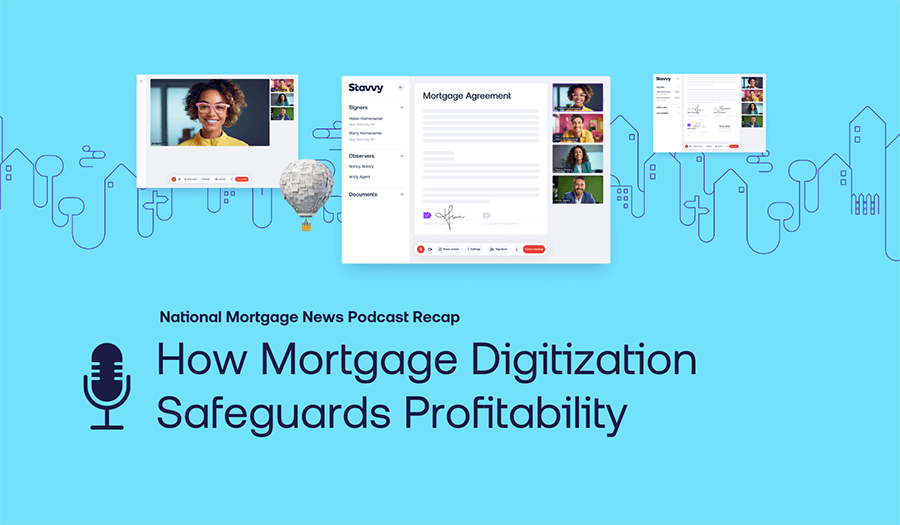In August of 2021, Jeremy Potter joined the Stavvy team as our Vice President of Legal and Capital Markets. His title hardly does him justice, though, as his experience and vision make him an invaluable resource across our organization.
After five years at Rocket Mortgage, he often refers to himself as a “curious one-time attorney.” While he remains a lawyer, professionally, he has moved into other areas like innovation, especially economic and tech trends, and is a glutton for thought-provoking content consumption. In other words, he’s exactly the kind of relentlessly curious, independent, and fearless thinker we want on our team, someone who is always looking for innovation and possibility at every turn.
During this episode of Finside Chats, Josh and Jeremy talk about everything from how technology empowers people to what happens after a residential closing. Plus, consumer data sensitivity, emerging technologies, and fractionalized ownership.
Listen Now: We Can Do This a Better Way—Mortgage Closing Tech, Innovation, & Data Sensitivity, featuring Jeremy Potter
It’s a beginning, not an end
It’s easy to think of a home closing as the conclusion, the dramatic final step in the homebuying process. But as Jeremy points out, the purchase is only just the beginning. The completed closing package may represent the start of a new life, the starting point for a whole host of maintenance and improvement costs, or new rights and responsibilities for a young professional. When you stop and think about it, buying a home puts into motion many consumer experiences, some positive and negative.
Likewise, for the capital markets, a loan closing creates a new asset that most homeowners know nothing about (that is until they receive a piece of a paper in the mail introducing them to their new loan servicer.) Over the life of a loan, unbeknownst to the buyer or not, a residential mortgage may be bought, sold, and bundled multiple times over. Jeremy explains that the mortgage asset or loan is extremely valuable to investors who back reliable income streams and American homeownership.
You get some data, you get some data, everybody gets some data
Large investors, institutional investors, and central banks evaluate several data points when purchasing a residential mortgage, including the duration of interest payments, quality of the collateral, and creditworthiness, to highlight a few.
Of course, all that critical data has to come from somewhere. Most of it is collected during the loan origination process and then shared with various parties along the way. However, Jeremy points out that the process is often disorganized, and frankly, putting consumer data at risk. “The industry is fragmented in a way that requires a lot of data transfers to get each piece of the closing process or the delivery process or the loan servicing process done. [...] Everybody has a different responsibility, and the data gets transferred again and again and again to let everybody do their piece of the job.” As a result, eventually, multiple people across multiple companies have access to the consumer’s sensitive financial information.
Jeremy describes that this is a problem that our existing technology creates and should be fixed immediately. He argues that instead of transferring data from person to person, we should keep it in one secure spot and then grant permission-based or role-based access. Fragmentation of the industry means no one is looking at the optimal way for all parties to share and use consumer data. He urges the industry to look at data sharing more holistically and create processes around giving the right people access at the right time.
A new and accessible approach to homeownership
As the capital markets become more specialized and vehicles like crowdsourcing become more commonplace, we may see changes in how homes are financed and owned. Jeremy and Josh discuss how this idea is already coming to life in commercial real estate with companies like Fundrise, an investment platform that offers retail investors fractional shares in commercial properties, ranging from grocery stores to strip malls and other holdings.
The same may be possible for residential real estate, where we ask the buyer how much of the home they want to own. “Once that's set, it’s a matter of taking the remainder and finding investors for it,” Jeremy explains. If someone says they only want to own half the house, the mature asset might be 50% of the home, and the buyer’s payments would reflect that. “All we're really talking about right now is taking the REIT concept and applying it to one home instead of 10,000,” Jeremy adds.
We’re very grateful that Jeremy is on this journey with us and are excited for him to join us again on the Finside Chats podcast. This episode was just further proof that he instinctively looks at every situation with an eye for making it better, easier, and smarter.
For more compelling content from Jeremy, check out his most recent blog posts on the advantages of digital for loss mitigation and how technology can help even the simplest financial transactions, like opening up a 529 investment account.
“Technology empowers people, not just consumers but also the people in the value chain and the experts that are advising consumers. We're now at a time where technology is delivering the right information to the better person at the better time. We're not quite there on the right person, at the right time, in the right way. But it’s better. It’s incrementally better.”
- Jeremy Potter, Vice President of Legal and Capital Markets
Learn more about how the  is taking real estate beyond documents.
is taking real estate beyond documents.



![[Webinar Recap] Advancing Your Digital Default Servicing Strategy](https://blog.stavvy.com/hubfs/advancing-your-digital-default-servicing-strategy-blog-recap.png)